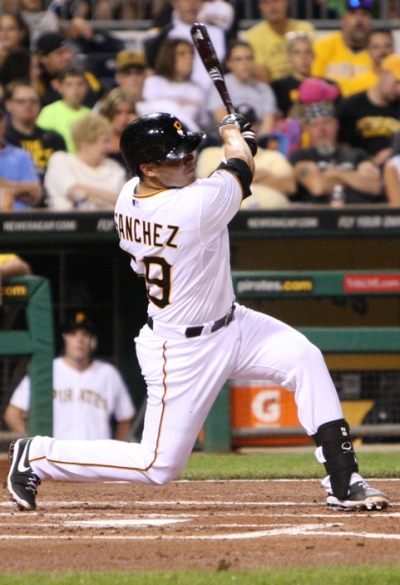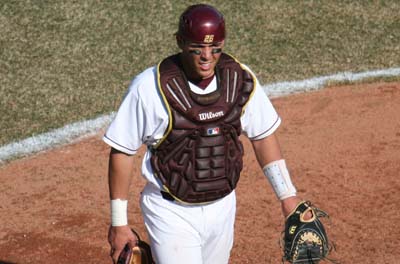
By
There are a lot of happy people in the city of Pittsburgh of late, and one of the happiest has to be former Boston College baseball player Tony Sanchez.
Sanchez was a junior in 2009 when the Pittsburgh Pirates made him the fourth overall selection in the Major League Baseball draft, the highest ever for a BC baseball player. The Miami native then began the often lengthy, sometimes arduous trek through the minor leagues most young players take to reach the majors, although relatively few actually complete the journey — less than 10 percent, in fact, ever even appear in a major league game.
But this summer has seen Sanchez defy the odds. After being called up to the Pirates in June for a two-game spell, followed by more time in the minors, Sanchez returned to the Pirates at the end of July, primarily to serve as a backup to starting catcher Russell Martin. Most observers predict he’ll stay with the parent club for the rest of the season.
Sanchez couldn’t have picked a better year in which to reach this plateau: After enduring 20 consecutive losing seasons — the longest such streak in American professional sports, as Pirates fans are reminded all too frequently — the Pirates are now poised to make the play-offs. Their success so far, and the prospect of more, has boosted attendance at the Pirates’ PNC Park and attracted increasing attention from the national media.
All of which makes for an emotional balancing act for Sanchez. He is relishing this opportunity to make good — and enjoying the Pirates’ upward trajectory — but has to be careful not to get too caught up in the moment, because he knows an injury or a sustained period of non-productivity can take his chance away, perhaps forever. So he is adhering to the time-honored code of conduct young players like him are supposed to follow.
“I know I’m in my rookie year,” said Sanchez, interviewed by phone recently one afternoon a few hours before the Pirates played a key game against divisional rival St. Louis Cardinals. “That means I speak when spoken to, and don’t get too comfortable, because these other guys know a lot more about what it means to play major league baseball. I don’t interrupt, I keep my ears and eyes open, and sponge as much knowledge as I can from what I see and hear.”
Not that Sanchez is a shrinking violet. He has a Twitter account (@Tony26Montana) with almost 15,700 followers that often features humorous gibes at himself or teammates as well as comments and insights on being a 25-year-old pro baseball player: “Best part about a chartered flight, no one yelling at you to turn off your electronics”; “Catching [Pirates pitcher Nelson Liriano] is like playing a video game. Any pitch, any count, any time.”
Sanchez does appear to have a healthy amount of self-deprecation. Talking about his formative years in baseball, he’ll explain how he wound up as a catcher: “I was too slow for the outfield and too overweight for the infield.”
But whatever his other qualities, few have disputed his baseball talent. He was a Minor League Baseball All-Star last year, and selected to play in the 2010 Florida State League’s Futures Game. While at BC, he was a finalist for the Coleman Company-Johnny Bench Award that recognizes the nation's top collegiate catcher, and a semifinalist for the Golden Spikes Award honoring the best amateur baseball player; named to the Louisville Slugger and American Baseball Coaches Association All-America Third Team, he also was the first BC player voted to the All-ACC First Team.
“I had flown under the radar in high school, but when it came time for college I wanted to play in a big conference,” said Sanchez. “I knew BC had joined the Atlantic Coast Conference, and [then-coach Mikio Aoki] told me I had a realistic chance of starting every game, so I thought it would be a good opportunity. And I fell in love with the campus and the city.”

Sanchez calls his time at BC “the best three years of life,” singling out the friendship of Assistant Athletic Director Dick Kelley and fellow BC catcher Harry Darling as major reasons for his development as an athlete and a person. “I solidified my game, and I made friends for life at BC.”
Sanchez says being selected by the Pirates was not disappointing in the least: “If you want to play baseball, you just want a team to give you a chance.” His time in the Pirates’ minor league system had its down periods, including two broken jaws and struggles on both offense and defense, and he acknowledges wondering if his career would ever take off. But it was all worth it when he joined the Pirates line-up on June 23 against the Los Angeles Angels of Anaheim.
“I remember it all,” he said. “Shaking my bat in the batter’s box when I got to hit for the first time, and how nervous I was. And how I was able to pick my Mom’s scream out of the crowd when I got my first hit.”
That first hit, coming on his first at-bat (“He threw me a fastball,” Sanchez said of the Angels’ pitcher, Joe Blanton, who faced him), also was memorable, albeit bizarre – the ball traveled all the way to center field and somehow got wedged in the scoreboard for a ground-rule double.
There haven’t been a whole lot of other hits since that one, but then Sanchez hasn’t had that many chances – as of August 15, he’d played in 10 games, with 10 hits in 32 at-bats. Such is the life of a backup catcher, especially when the guy in front of you is a seasoned, accomplished veteran like Russell Martin.
“Russell and I hit off right from the start,” Sanchez said. “He’s been very welcoming, and extremely helpful in giving me pointers about the game.”
Sanchez also has gravitated to players like Pedro Alvarez (who made the All-Star Game this year) and Neil Walker, both of whom arrived in the majors a couple of years ago. “They have established themselves as everyday big-leaguers, but are only a few years removed from where I am now. So they really understand what you’re going through and you can ask them questions.”
And there are the players Sanchez knew in the minors, like Gerrit Cole, who also are finding their feet and sharing in the wonder of it all.
“Getting used to the majors is a big adjustment,” said Sanchez. “The pitchers you’re batting against, the guys you’re playing with, the amount of people in the stands — it’s all so different than what you’re used to. There’s just nothing like it.”
And there’s nothing like cutting your big league teeth in the midst of a pennant race, with the chance for the team to put two decades of futility behind it. One of the axioms of baseball is that you’re supposed to keep an even keel, shut out the hoopla and drama, and tend to business. But the Pirates aren’t pretending they don’t know what’s at stake, according to Sanchez.
“We all talk about it openly. The guys have worked so hard to get to this point, where you can almost taste the champagne. It helps motivate us every night. And Pittsburgh is such an awesome city, and people are really out to support us – you know that when you get a crowd of 30,000-plus for a Monday night game. They deserve to see the Pirates have a winning season. They can feel it.”
Sanchez, meanwhile, feels his own sense of accomplishment in reaching the majors: “You have to focus, sure, but every now and then you realize, ‘This is my dream.’”



